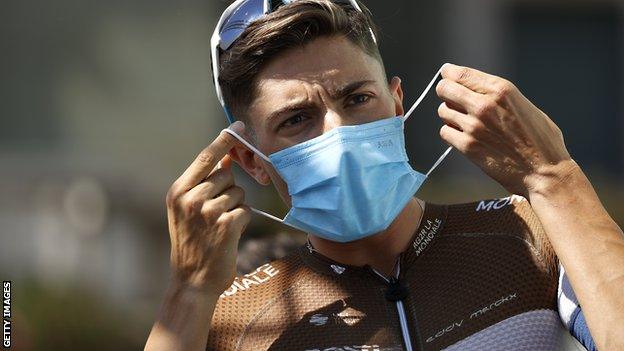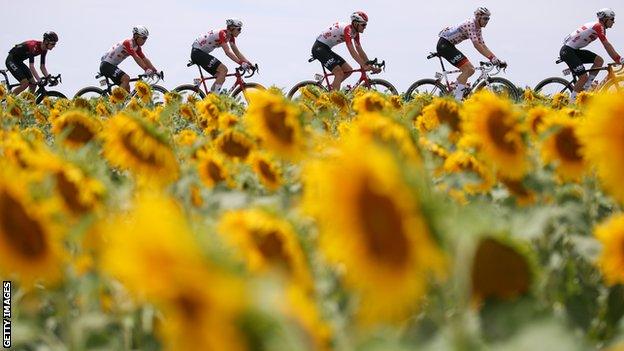Tour de France 2020: How does the Tour avoid Covid-19?
- Published

The Tour de France begins in Nice on 29 August and runs until 20 September
Tour de France |
|---|
Dates: 29 August - 20 September |
Coverage: Live text commentary on each stage on the BBC Sport website and app |
The Tour de France will travel for 21 days around a whole country, passing through towns and cities and thousands of people.
Normally you would expect plenty of people along the route, packed in squares, millimetres away from the riders at the tops of climbs. Less of this will happen in 2020, a year which will go down in history for Covid-19.
This year, social distancing will be key and spectators' presence will be managed, especially in the departure and arrival areas, according to the rules published by authorities. Fans and riders will have to keep distance and wear a mask at all times.
No kisses on the podium, no selfies with the athletes, no autographs. Stage winners and category leaders won't be handed any flowers, prizes or jerseys: they will have to pick them up themselves and celebrate in solitude.
Have there been any problems so far?

American rider Warbasse tested positive last week
Since the season resumed with the Vuelta a Burgos, cycling authorities have done a good job to guarantee safety around the world of professional cycling, with virtually no in-race cases of Covid-19.
AG2R's American rider Larry Warbasse tested positive last week and he had recently taken part in Il Lombardia. As a precautionary measure, the French team decided to prevent Geoffrey Bouchard, Axel Domont and Ben Gastauer from taking part in the last stage of the Tour du Limousin.
But in the majority of races, like Milano-San Remo and Il Lombardia, and the Criterium du Dauphine - the Tour's general rehearsal - things have panned out well.
This is also what Xavier Bigard, medical director at cycling's governing body the UCI and safety protocol coordinator, says: "As of today we can cross our fingers because we are very happy, but it's an instant picture of the situation and things can change quickly.
"We have re-thought the moments in which contact can happen, from the riders signing to the arrival, from the award ceremony, to media activities.
"All team members have to undergo two diagnostic tests for Covid-19, six days and three days ahead of the start, while they have to compile a health check questionnaire twice a day during the race.
"We worked out the concept of the safety bubble: each team will have to create and maintain a protective bubble around itself to avoid any contact with external people, whose state of health cannot be guaranteed, while all team bubbles will link to form a peloton bubble."
Two strikes and the team is off the Tour

Riders will face strict coronavirus procedures for this year's race
In fact, diagnostic tests will also take place on both rest days, while the role of team doctors will be essential: they are responsible for guaranteeing medical safety within their team's bubble and check staff members' condition throughout the race.
Much is at stake: if two members of a team log a high score on the questionnaire, and that means they could be at risk but don't even need to be positive, the whole team will be expelled.
"An enormous job has been done to guarantee competition resumption and we are happy of how things have gone," says Carlo Guardascione, head of medical at Team Bahrain McLaren.
"The UCI protocol is an important instrument, although not always easy to apply: Why are we having a Covid-19 swab six days ahead of the start, when all of the team members are at their homes? We have a three days range to run it and it's over a weekend: how about laboratories being closed?
"Having said that, bubbles work fine. I have seen it in Burgos, Poland or at the Criterium, as I took part in those races. I felt safe. I know ASO, I am sure they will do things right at the Tour too."
While it's possible to mitigate infection risk, it's impossible to prevent it 100%: Bigard is well aware of this. "The most problematic situations are bound with teams' accommodation. Each team will be grouped on a single floor or wing of a hotel, but you can't guarantee for hotel personnel, as they are not part of the bubble."
Teams have thought of individual solutions. "We bought machines to sanitise all rooms, bikes, cars and buses we use," Guardascione adds.
"We re-budgeted some resources initially allocated for marketing and communication and signed a contract with a company that deals with operating theatres sterilisation," says Andrea Agostini, chief operating officer at UAE Team Emirates.
Is it realistic to imagine a race interruption? What would have to happen? "I don't think so. If someone tested positive, this person would be isolated and treated," added Agostini.
"A Covid-19 cluster would have to explode within the peloton, but with the help and responsibility of us all and the measures in place today, I would rule out this possibility."
What about the fans?

Spectators have been wearing face coverings at cycling events this season
It will be a different Tour for fans too, and not only because it's starting at the end of August.
"2020 will be my 42nd time in the last 43 years," says Jannie Dreesen, president of Tom Dumoulin's fanclub in Bestuur, Holland.
"I am not scared at all," Dreesen adds. "Those who join made a choice and will respect the rules, even if it won't be easy. Maybe some of them are exaggerated, but all we want is to see Tom: if there are rules to do this, we'll follow them.
"Between 30 and 50 of us are going to La Planche des Belles Filles on the last Saturday and then we move on to Paris, where we've rented a pub: if Tom wins the Tour, we will celebrate together."
Safety will surely forbid those wings of fans opening up in front of a climbing rider, which seem incompatible with the concept of bubble… "French organisers can prevent people on the course completely, I am sure," Agostini adds.
"We will react with creativity then," counters Dreesen. "If we can't follow the race on the Planche des Belles Filles, we will drive up the previous day and hammer some wooden crosses along the course with our shirts on them."
The setting up of a Grand Tour race is an enormous effort, but doing it in 2020 has been even more difficult. What we have heard in terms of safety measures and fans' attitude let us hope for the best though. And now, over to the riders.